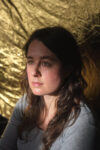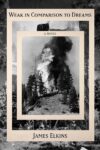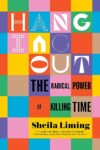EXCERPTS FROM ROUNDTABLE DISCUSSION
WITH CAREN BEILIN, STEVEN DUNN, VI KHI NAO, HILARY PLUM, & MATTHEW JAKUBOWSKI
JANUARY 18, 2017 KELLY WRITERS HOUSE PHILADELPHIA, PA
Originally published in Full Stop Reviews Supplement #2 (Summer 2017)

“Marginalized Work, Innovative Critique” took place at the Kelly Writers House in Philadelphia. It brought together several editors and reviewers (all prose writers, too) to discuss innovative dynamics in contemporary criticism. Traditional modes of literary critique might include a summary of a novel’s plot, maybe a recommendation (or not) to purchase. But how, the participants asked, might experimental forms of criticism better serve marginalized works, including translations and nontraditional writing by women, especially when these works often eschew plot or a patriarchal (logical, hierarchical) ordering of meaning/event? What kinds of radical tactics must be performed in the criticism of new radical work?
***
STEVEN DUNN: I sent [Fred Moten’s book of poetry] to a graffiti artist in Chicago, and one in LA, and one in Denver. I don’t know one in Denver, so how do you get to know a graffiti artist, you stroll the streets at mid-night looking for a graffiti artist. So I do that. I’ll like hang out, where do I see graffiti? And I’ll go and meet somebody hopefully, “Hey, I’m not weird, but I like art also.” And so I have these three graffiti artists in different cities like quoting books being really disobedient, making art from these books and taking pictures of them during the day and those will be like a review. I feel like it’s more an engagement than a review.
MATTHEW JAKUBOWSKI: The publishers are doing the bulk of the work. Finding these authors. Bringing their work to the public under really hard circumstances. Because there are forces at work in the publishing industry that don’t want these books to succeed. That’s why we call them marginalized. There are people who are actively out there suppressing and oppressing voices out there. Whether they do it overtly, covertly, in ways that they don’t realize.
VI KHI NAO: I want to say first a little bit about my sister. My sister loves reading reviews. And she reads a lot of mainstream literature. So one day she was like really mad because she read this book that was mainstream and she read a review of it and she said, “This is so boring.” And this was a mainstream review of a mainstream book. And for her, she prefers main- stream genre in poetry, fiction, nonfiction. And then one day, she was so delighted, she told me, “Vi, I found a really great review, it’s a negative review but it’s so awesome. Look at how this person trashed this book in a very eloquent way.” And I thought, wow. And I know I do a lot of experimental writing, so I exclude my family a lot from really enjoying my love for language. So I started writing work that is more mainstream, to accommodate their love and their need, and their need to connect with me. But I, because of my experimental nature, and I was born like that, I turned a harlequin romance into something not harlequin at all, as you will see in Fish in Exile. But I had no experience with writing reviews, and a lot of reviews I read, like my sister said, I find boring. Even if it’s a review of an experimental piece. That review, that mainstream review of that experimental piece, is boring. So I thought what are some ways that I can change that landscape so that it’s not boring. When I was in Montana and I was with my ex and she said, “This alfalfa field has stopped living. It’s no longer interested in manifesting itself as an alfalfa field anymore. It’s barren.” And she said it’s a result of the removal of wolves and other predators. So she said, “What is the best way to reintroduce the wolf into the landscape of mainstream literature?” And I think experimental writing can and will do that if everyone is willing to do it.
There is something to learn from mainstream writing. When I was researching on what distinguished mainstream writing from experimental writing, I noticed that actually some mainstream writing is actually very innovative, but it innovates sporadically and sparingly. Mainstream writing does have a function in that it’s able to capitalize on the beauty of some- thing that is original but they do it in so few, that when people get to it they get so excited. And so the thing I notice with my own writing, when I’m writing reviews of experimental writing, how can I introduce pockets sparingly and sporadically of mainstream material inside my experimental work, so that it has that same pocket, so that when a mainstream reader reads my experimental review they feel they can connect with that piece and feel escorted into the experimental world.
HILARY PLUM: My response to [Belle Boggs’s The Art of Waiting: On Fertility, Medicine, and Motherhod] was just like this real rage. Some people in this room know that because during the three weeks I was reading it, if people came to my house I would just read parts of the book to them, so they could feel what I was feeling. I think in terms of being not boring, I thought, Ok, whatever I’m feeling, I have to seize—whatever this feeling is I have to figure it out, and try to make something of it. So what I did is write this review which wanted to think about the essay, to think about the way things like empathy and judgement work in the essay, and how they had not worked in this book. One thing, the book was published by Graywolf Press, which is kind of a larger indie press, and had recently published Claudia Rankine’s Citizen and Maggie Nelson’s The Argonauts. That was kind of one place that I was starting from. This independent press, this press that’s working to continue to be a voice for independent literature shouldn’t be publishing this essentially commercial book, is what I felt, and what I said. I felt that including the personal was a way of being ethically in a conversation with a book and also being real about who I was and what I might want from a book on this topic, which is a topic that is so sort of profoundly connected to a lot of social and political and personal experiences. After the review was published, I did hear from a lot of people who were hungry for that topic and wanting it to be discussed in a way that did the work of connecting it to our culture, and that book did that, to me, in such a timid way that it really sort of defeated itself in a lot ways.
MATT: I think there’s the financial considerations. A lot of publishers bank on their white male backlist. That’s how they make their money and so they repeat that financial pattern. They seek to crown white male geniuses and by doing that they spend all their money and all their effort—they pour it into that and that just pushes everybody else to the side. I focus on translation and writing by women. I have been in conversations with publishers and they’re giving me their card and want to be in touch, give me their books, and I say, “that’s great, I’m only writing reviews of books by women right now,” and the guy—the publisher, the CEO—said, “Oh, Chick Lit.” The whole category of anything not written by a man—Chick Lit. And he said it as a joke, he wanted me to laugh. It’s out there. It’s actively happening.
CAREN BEILIN: I would just say that it’s also actively happening in the small press land, too. I wrote a review recently for Full Stop, for a wonderful book put out by Anti-Oedipus press. And I loved the book. It’s a fanfiction of Heart of Darkness called Mistah Kurtz!, it’s really neat. But I wrote the review in part, because I wanted to say in a parenthesis, Fuck you, Anti-Oedipus Press. You’ve published thirteen men and one woman in your whole career as a small press, and I won’t write a review without saying that that’s what’s going on. And it dismays me greatly because Anti-Oedipus Press puts out very interesting, experimental, really dynamic books and I think they should have much better policies, it’s so sad to see a press with such great taste not extending their taste to a variety of other people. For the risk of making a binary between big press and small press, it’s in a few different places.
STEVEN: Just personal experience, my book is trying to be published, my agent is trying to publish it with Penguin, Hachette, or however you pronounce that, all these big places, and always the bottom line is, “We can’t find a wide enough readership for it.” So the editors may be interested in it but the financial department—So I wonder, what is a readership, what is it code for. They will say, It’s too weird, it’s not really a novel, something like that. But I feel there’s some other things. Especially in Britain, there was an article that came out, Is there really only one black male novelist in Britain? So out of all the books published only one black dude got published in the UK? It says something.
Caren Beilin is the author of Blackfishing the IUD, published by Wolfman Books and a 2019 CLMP Firecracker Award nominee for nonfiction. Her previous books are the memoir, Spain (Rescue Press, 2018) and The University of Pennsylvania (Noemi Press, 2014). She is a former reviews editor at Full Stop and teaches creative writing at the Massachusetts College of Liberal Arts in the Berkshires.
Steven Dunn is the author of the novels Potted Meat (Tarpaulin Sky Press, 2016) and water & power (Tarpaulin Sky 2018). He was born and raised in West Virginia, and after ten years in the Navy, he earned a BA in Creative Writing from the University of Denver. He was reviews and interviews editor for Horse Less Press and teaches Creative Writing at Regis University’s Mile High MFA. Some of his work can be found in Columbia Journal and Granta Magazine, and Best Small Fictions 2018.
Vi Khi Nao is the author of four poetry collections: Human Tetris (11:11 Press, 2019), Sheep Machine (Black Sun Lit, 2018), Umbilical Hospital (Press 1913, 2017), The Old Philosopher (winner of the Nightboat Prize for 2014), and of the short stories collection A Brief Alphabet of Torture (winner of the 2016 FC2’s Ronald Sukenick Innovative Fiction Prize), the novel Fish in Exile (Coffee House Press, 2016). Her work includes poetry, fiction, film, and cross -genre collaboration and her reviews have appeared in places such as Fanzine, Entropy, and Rhizomatic Ideas. She was the Fall 2019 fellow at the Black Mountain Institute.
Hilary Plum is the author of the novel Strawberry Fields, winner of the Fence Modern Prize in Prose (2018); the work of nonfiction Watchfires (2016), winner of the 2018 GLCA New Writers Award; and the novel They Dragged Them Through the Streets (2013). She has worked for a number of years as an editor of international literature, history, and politics. She teaches creative writing at Cleveland State University and in the NEOMFA program and is associate director of the CSU Poetry Center. With Zach Savich she edits the Open Prose Series at Rescue Press. Recent work has appeared in Granta, the Brooklyn Rail, the Los Angeles Review of Books, College Literature, Fence, and elsewhere.
Matthew Jakubowski is a fiction writer and literary critic. His previous works of critifiction about literature in translation have appeared in Full Stop, Interfictions Online, gorse, and 3:AM Magazine. He is a contributing editor at The Critical Flame and a member of the National Book Critics Circle. He lives in West Philadelphia.
This post may contain affiliate links.







